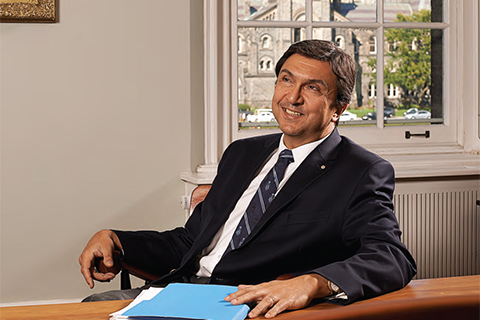Over the past few years, the University of Toronto has put considerable energy into improving the student experience on all three campuses. We’ve developed more opportunities for undergraduates to engage in research and small-group learning. We’ve invested in new recreational and athletics facilities, and created spaces specifi cally for our many commuter students. We’ve also provided more recognition for great teachers, and paid close attention to teaching in all our academic personnel decisions.
Our faculty, many of whom are international leaders in their fields, help students develop skills and knowledge so they in turn can assume leadership roles. But our staff also has a huge impact on student and faculty experiences at the university. Our staff members provide administrative expertise and support to our faculties and departments, keep computer networks functioning, prepare food, raise funds, maintain our buildings and grounds – and perform countless other jobs that are vital to keep U of T running smoothly. Without the creativity and dedication of a highly motivated staff, we simply would not be one of the best public universities in the world.
Finding and retaining the best possible staff, then, is central to our mission. That’s why, even though our staff members are capably represented by 22 separate unions at the bargaining table, we can’t afford to define staff relations solely on the basis of collective agreements. And that’s also why, last year, we conducted a survey of our 10,000-plus staff and faculty about their work experience. According to our survey consultants, U of T fared well compared to other large public-sector institutions. Employees across the university expressed a strong sense of pride about working here. Eight in 10 said they felt motivated in their job, and an even higher number said they felt “proud” to work at U of T.
Not everything was sweetness and light. Responses to questions about workload, stress and life balance indicate that we need to look more carefully at the demands we place on staff, and at ways in which we can support employees more effectively. That’s no surprise given the major growth in enrolment in the last decade. Staff indicated concerns, too, about opportunities for personal growth and development.
Our efforts to create a fulfilling workplace are getting us noticed, however. We’ve appeared on MediaCorp’s list of Canada’s top 100 employers for the past three years. Earlier this year, MediaCorp named U of T one of the country’s 25 Best Diversity Employers. U of T is also one of the top-10 family-friendly employers in Canada, according to Today’s Parent magazine. Working with our unions, we offer a wide range of employee services, including generous health benefits, training and career development, and recreation centre memberships. The university has also designed programs to help employees care for elderly relations, deal with child-care emergencies and support their children’s post-secondary education.
The university honours staff annually with prizes for outstanding contributions. In keeping with our mission, the Joan E. Foley Quality of Student Experience Award recognizes a staff member who has made a significant contribution to improving academic or extracurricular student life on campus. The Stepping Up Awards honour staff who significantly help advance the university’s mission to rank among the best public universities in the world. The Chancellor’s Award recognizes outstanding staff, and some faculties offer their own awards as well. When it comes to employee satisfaction, however, I think U of T offers something much more important than awards or great services or competitive salaries. Higher education and advanced research together represent causes that people from any walk of life can support. Staff members know that, notwithstanding individual frustrations with aspects of their work, the mission of the university is fundamentally valuable to society and idealistic in orientation.
That’s very helpful to U of T, because, in a globally competitive society, no organization can afford to lose exceptional employees. Our success has always been about people – great students who become great alumni, great faculty and great staff. We are fortunate that so many talented people have come here in search of fulfilling careers – and have stayed because of our ability to provide them with one.
Sincerely,
David Naylor







No Responses to “ Behind the Scenes ”
I’m pleased that President Naylor’s message recognizes the hard work, dedication and contribution of staff toward the academic mission of the university. While President Naylor is right in saying that “our staff members are capably represented by 22 separate unions” and that the university is “working with our unions” to “offer a wide range of employee services,” there is one group that is not collectively represented in any way: senior administrative staff in the professional, management and confidential group. They deserve to be included in the accolades, too. The president’s recognition of our work is timely and inspiring.
P. C. Cho (MA 1994)
Governor for Administrative Staff
U of T Governing council
Toronto